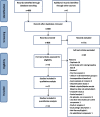Lithium for prevention of mood episodes in bipolar disorders: systematic review and meta-analysis
- PMID: 25530932
- PMCID: PMC4272359
- DOI: 10.1186/s40345-014-0015-8
Lithium for prevention of mood episodes in bipolar disorders: systematic review and meta-analysis
Abstract
Background: In a previous meta-analysis of randomized controlled trials comparing lithium with placebo as a long-term treatment in bipolar disorders, we observed a clear preventative effect for manic episodes; however, the effect was equivocal for depressive episodes. Since then, the evidence base has grown further. In this update, we furthermore present the data on efficacy of lithium in comparison to alternative drug treatments. In addition, we analyze the data comparing lithium with placebo and other treatments regarding drop-outs due to reasons other than a mood episode and completion of study (no mood episode and no drop-out to reasons other than a mood episode).
Methods: Randomized controlled trials (RCTs) were sought comparing lithium with placebo and lithium with an alternative treatment in bipolar disorders where the stated intent of treatment was prevention of mood episodes. To this purpose, the Cochrane Central Register of Controlled Trials (CENTRAL) was searched. Reference lists of relevant papers and major textbooks of mood disorders were examined. Authors, other experts in the field, and pharmaceutical companies were contacted for knowledge of suitable trials, published or unpublished.
Results: For the comparison of lithium with placebo, seven trials (1,580 participants) were included. Lithium was more effective than placebo in preventing overall mood episodes (random effects RR 0.66, 95% CI 0.53 to 0.82), manic episodes (random effects RR 0.52, 95% CI 0.38 to 0.71), and, dependent on the type of analyses applied, depressive episodes (random effects RR 0.78, 95% CI 0.59 to 1.03; fixed effect RR 0.73, 95% CI 0.60 to 0.88). Lithium was inferior to placebo in leading to drop-outs for reasons other than a mood episode (random effects RR 1.33, 95% CI 1.07 to 1.65) but superior to placebo on study completion (random effects RR 1.69, 95% CI 1.12 to 2.55). For the comparison of lithium with anticonvulsants, seven trials were included (n = 1,305). In prevention of manic episodes, lithium showed superiority compared to anticonvulsants (random effects RR 0.66, 95% CI 0.44 to 1.00). However, there was no significant difference regarding prevention of overall mood episodes, depressive episodes, dropping-out to reasons other than a mood episode, or study completion.
Conclusions: The evidence base for lithium in the long-term treatment of bipolar disorders has strengthened. With no other drug available having such ample and consistent evidence for its efficacy lithium remains the most valuable treatment option in this indication.
Keywords: Anticonvulsants; Bipolar disorders; Lithium; Long-term treatment; Meta-analysis; Placebo; Randomized controlled trial; Systematic review.
Figures









References
-
- Bauer M, Crossley NA, Gerber S, Bschor T. The acute antidepressive effects of lithium: from monotherapy to augmentation therapy in major depression. In: Bauer M, Grof P, Müller-Oerlinghausen B, editors. Lithium in Neuropsychiatry. The Comprehensive Guide. London: Informa Healthcare; 2006. pp. 109–128.
LinkOut - more resources
Full Text Sources
Other Literature Sources

